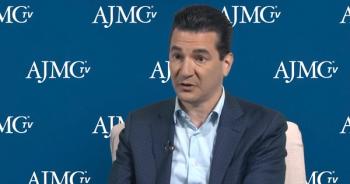
Insurance
Latest News
Latest Videos

More News

The Committee for a Responsible Federal Budget released a detailed report on potential finance options for implementing "Medicare for All"; employers beginning to lessen dependence on high-deductible health plans; Juul to cut nearly 500 jobs by end of 2019.

We learn most when we have benchmarking and we can examine our own processes of care, explained Michael Kolodziej, MD, vice president and chief innovation officer at ADVI Health, Inc.

Every week, The American Journal of Managed Care® recaps the top managed care news of the week, and you can now listen to it on our podcast, Managed Care Cast.

This week, the top managed care news included an effort by the Trump administration to bolster Medicare Advantage; an abortion case from Louisiana reached the Supreme Court; the study of adapting to changing oxygen levels wins the Nobel Prize.

Value-based models continue to enter the healthcare system, affecting a variety of fields, including primary care. And while success stories have been shared by payers and CMS touts these models as a way to “save” primary care, that's not the current reality, said Theresa Hush, chief executive officer of Roji Health Intelligence, LLC, during a session on population health management at the National Association of Managed Care Physicians 2019 Fall Managed Care Forum, held October 10-11 in Las Vegas, Nevada.

Every week, The American Journal of Managed Care® recaps the top managed care news of the week, and you can now listen to it on our podcast, Managed Care Cast.

Unraveling the possible causes and triggers of agitation in people with dementia is worthy of detective work, according to a recent presentation.

This week, the top managed care news included Medicare cuts hospital payments over readmissions; a second-generation chimeric antigen receptor T-cell therapy shows promise; a diabetes drug is approved to prevent kidney failure for the first time.

President Donald Trump has issued an executive order that will protect Medicare and bolster Medicare Advantage (MA) in response to Democrats' Medicare for All proposals.

Medicare cut payments to 2583 hospitals for penalties related to 30-day patient readmissions; a judge delivers a mixed ruling on Virginia abortion law; a study finds vitamin A is linked to a lower risk of squamous cell carcinoma.

Here are the top 5 articles for the month of September.

Converting from analogue insulin to human insulin is associated with a clinical insignificant increase in glycated hemoglobin of 0.16% but with improved insulin adherence.

This article explores Northwestern Medicine’s decision to participate in a Medicare alternative payment model (APM) despite projected losses.

CMS made an “error of law” when it tried to expand a site-neutral payment system, a federal judge ruled.

Providing access to complex therapies through the Medicare market can benefit patients who are disproportionately ignored by socioeconomic status, said Scott Gottlieb, MD, former FDA commissioner (2017-2019).

CMS' new radiation oncology payment model is slated to begin on January 1, 2020, but the significant billing changes that the model requires will require more time.

Coverage of our peer-reviewed research and news reporting in the healthcare and mainstream press.

An evaluation of the Multi-Payer Advanced Primary Care Practice Demonstration found mixed results in terms of quality of care provided to Medicare and Medicaid beneficiaries.

Coverage of our peer-reviewed research and news reporting in the healthcare and mainstream press.

Here are the top 5 articles for the month of August.

A new government analysis revealed that despite a previous warning, CMS failed to take steps to ensure that Medicare Part D does not also pay for drugs that should be covered under the Part A hospice benefit; with studies of antidepressants’ safety and efficacy only following patients for a few years and with more people taking antidepressants for longer periods of time, health professionals are concerned that some people taking the drugs for extended periods shouldn’t be and are thus subjecting themselves to side effects and potential health risks; Medicaid advocates in Nebraska have filed a lawsuit to try and force the state to implement Medicaid expansion no later than November 17, 2019.

Medicare Shared Savings Program accountable care organization (ACO) network comprehensiveness is associated with stable patient assignment year to year. Panel stability was significantly associated with improved diabetes and hypertension control in the short term.

Authors from Facing Our Risk of Cancer Empowered (FORCE), a nonprofit organization focused on hereditary cancer, discuss the importance of genetic testing, guidelines, and coverage considerations.

A class-action trial begins Monday in Hartford, Connecticut seeking to end Medicare regulations around something called “observation care” in the hospital; California hospitals are providing significantly less free and discounted care to low-income patients because the Affordable Care Act reduced the number of uninsured patients; The American Academy of Pediatrics released its first policy statement about how racism affects the health and development of children and adolescents.

The FDA ordered 4 companies to stop selling 44 of their flavored e-liquid and hookah tobacco products that lack the required approval for sale; CMS has yet to implement a 2014 law preventing unnecessary, expensive screening tests (magnetic resonance imaging, computed tomagraphy scans and other tests) that could harm patients and waste resources; Amarin, which is seeking FDA approval for an expansion of Vascepa labeling to include data that showed a 25% reduction in the risk of heart attacks and strokes, said the FDA has scheduled an advisory committee meeting for November 14.
















